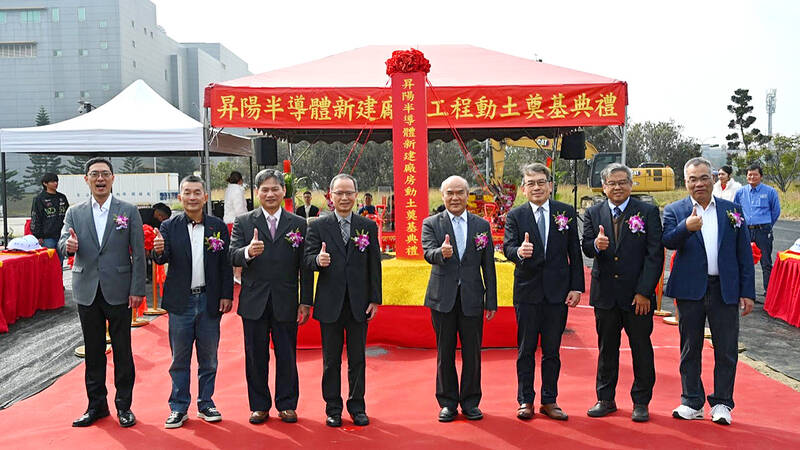Phoenix Silicon International Corp (昇陽半導體), the world’s No. 2 supplier of reclaimed wafers, yesterday broke ground on a NT$2.5 billion (US$76.3 million) plant in Taichung as the company expands capacity to meet rising demand.
The artificial intelligence (AI) boom has boosted the production of advanced chips that power AI servers and other edge devices with AI functions, accelerating demand for reclaimed wafers, Phoenix said in a statement.
AI chips that are made on advanced technologies such as 4-nanometer consume more reclaimed wafers than those with less advanced technologies, as their production requires delicate processing and more equipment testing to ensure optimal yields, the company said.

Photo courtesy of Phoenix Silicon International Corp
Chipmakers use more than two reclaimed wafers for testing and equipment checking to produce one 3-nanometer or 5-nanometer wafer, it said.
Rising consumption of reclaimed wafers after customers start producing 2-nanometer wafers this year is to be a major growth driver for Phoenix, the company said.
About 70 to 75 percent of the company’s reclaimed wafers are used for advanced chips with leading process technologies, it said.
Phoenix plans to expand its capacity by about 23 percent to 800,000 12-inch wafers a year by the end of this year, compared with 630,000 last year, the statement said.
Capacity would rise further when the new Taichung plant starts operating next year, it said.
Reclaimed wafer suppliers usually expand capacity 2.3 times faster than their customers, Phoenix said.
Another driver is customers’ overseas capacity expansion, as one of its key customers is rapidly expanding advanced chip capacity in the US, Phoenix said.
Phoenix did not disclose the name of its customer, but Taiwan Semiconductor Manufacturing Co (台積電) is the only Taiwanese chipmaker that is producing advanced 4-nanometer chips at its first factory in Arizona.
Revenue this year is to expand by a double-digit percentage from NT$3.55 billion last year, the company said.
The reclaimed wafer business accounted for 80 to 85 percent of the company’s revenue in the first half of last year, with wafer thinning making up the remaining 15 to 20 percent, Phoenix said.

WEAKER ACTIVITY: The sharpest deterioration was seen in the electronics and optical components sector, with the production index falling 13.2 points to 44.5 Taiwan’s manufacturing sector last month contracted for a second consecutive month, with the purchasing managers’ index (PMI) slipping to 48, reflecting ongoing caution over trade uncertainties, the Chung-Hua Institution for Economic Research (CIER, 中華經濟研究院) said yesterday. The decline reflects growing caution among companies amid uncertainty surrounding US tariffs, semiconductor duties and automotive import levies, and it is also likely linked to fading front-loading activity, CIER president Lien Hsien-ming (連賢明) said. “Some clients have started shifting orders to Southeast Asian countries where tariff regimes are already clear,” Lien told a news conference. Firms across the supply chain are also lowering stock levels to mitigate

IN THE AIR: While most companies said they were committed to North American operations, some added that production and costs would depend on the outcome of a US trade probe Leading local contract electronics makers Wistron Corp (緯創), Quanta Computer Inc (廣達), Inventec Corp (英業達) and Compal Electronics Inc (仁寶) are to maintain their North American expansion plans, despite Washington’s 20 percent tariff on Taiwanese goods. Wistron said it has long maintained a presence in the US, while distributing production across Taiwan, North America, Southeast Asia and Europe. The company is in talks with customers to align capacity with their site preferences, a company official told the Taipei Times by telephone on Friday. The company is still in talks with clients over who would bear the tariff costs, with the outcome pending further

Six Taiwanese companies, including contract chipmaker Taiwan Semiconductor Manufacturing Co (TSMC, 台積電), made the 2025 Fortune Global 500 list of the world’s largest firms by revenue. In a report published by New York-based Fortune magazine on Tuesday, Hon Hai Precision Industry Co (鴻海精密), also known as Foxconn Technology Group (富士康科技集團), ranked highest among Taiwanese firms, placing 28th with revenue of US$213.69 billion. Up 60 spots from last year, TSMC rose to No. 126 with US$90.16 billion in revenue, followed by Quanta Computer Inc (廣達) at 348th, Pegatron Corp (和碩) at 461st, CPC Corp, Taiwan (台灣中油) at 494th and Wistron Corp (緯創) at

NEGOTIATIONS: Semiconductors play an outsized role in Taiwan’s industrial and economic development and are a major driver of the Taiwan-US trade imbalance With US President Donald Trump threatening to impose tariffs on semiconductors, Taiwan is expected to face a significant challenge, as information and communications technology (ICT) products account for more than 70 percent of its exports to the US, Chung-Hua Institution for Economic Research (CIER, 中華經濟研究院) president Lien Hsien-ming (連賢明) said on Friday. Compared with other countries, semiconductors play a disproportionately large role in Taiwan’s industrial and economic development, Lien said. As the sixth-largest contributor to the US trade deficit, Taiwan recorded a US$73.9 billion trade surplus with the US last year — up from US$47.8 billion in 2023 — driven by strong